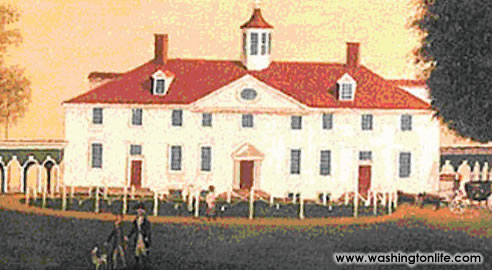Going Home to Mount VernonCHRISTMAS, 1783 BY DONNA EVERS
Our history books don't generally point out that there were two long years between the American victory at the Battle of Yorktown and the actual end of the war. General George Washington was painfully aware of the delay because he had to keep his troops battle-ready in New Jersey until the Treaty of Paris, which officially ended the war and gave the new country its independence, was finally signed. So, from October 1781 until November 1783, Washington waited with his soldiers, when all he wanted was to be home with his wife and family at his beloved Mount Vernon. Washington's home was to him what Monticello became to his colleague, Thomas Jeffersonthe center of his spiritual universe. Like Jefferson, he was a consummate renovator who oversaw every detail of construction and improvements. And now, Washington was especially anxious to get home to Mount Vernon; he had visited his family home only once during the entire period of war, and saw that the farms were falling into neglect and the Georgian house, with its wood siding carved to look like stone, was badly in need of repair. Before the war, George and Martha Washington entertained regularly at Mount Vernon, especially during the Christmas season when family and friends gathered around the dinner table to enjoy good food and drink. Martha's holiday table was famous for meat pie and "great Cake". The meat pie was said to include turkey, goose, chicken, partridge, pigeon, hare, woodcocks and moor game. The "great Cake" was a giant brandy-soaked fruitcake whose recipe started out with "Take 40 eggs and 4 pounds of butter..." When Washington got word that the treaty was signed in late November 1783, he knew he had much to do before he could start the trip home for Christmas. He had to officially accept transfer of power from the British troops in New York, bid farewell to his own soldiers and officers, and resign his commission to the Continental Congress in Annapolis, Maryland. In his book "General Washington's Christmas Farewell," historian Stanley Weintraub describes the emotional visit Washington made to his troops at Fraunces Tavern in New York City. Washington was so choked up he couldn't speak, so the farewell address he had prepared as a speech was published in the newspapers instead. The soldiers, like the whole country, idolized their brave and handsome 6'4'' commander, and the farewell visit left both Washington and his men in tears. Washington then rowed across the Hudson River to New Jersey, and set out on horseback with a wagon and a few aids for the three hundred mile journey that would finally bring him home. It took him four days to get to Philadelphia, where he turned in the list of expenses he had paid out of his own pocket for himself and his troops over the long years of war. The sum came to $63,315. He refused any other pay for being commanding General of the Army. From there, he went on to resign his commission to the Continental Congress in Annapolis, Maryland.
When he left Annapolis, this famously modest man believed that his service to his country was over, and that he would finally be able to return home and live the quiet life of a country gentleman. Of course, he was soon pressed back into service, first to lead the constitutional convention in 1786, and then to lead the new country. Historians say that if George Washington had not been the man he was, America might have become a monarchy. Washington's troops would have stayed with him and the adoring public would have been happy to make him their king. Washington's refusal to take the power that certainly was his at this point in history and his later insistence in limiting his service as president to two terms caused King George III to say that Washington was "the greatest character of his time". Ironically, while years of war and public service didn't kill George Washington, his obsession with taking care of his family home did. He managed his 8000 acre estate made up of many buildings and a total of five farms with personal attention to every detail of construction, maintenance and experimentation with new farming methods. In 1799, while inspecting his farms in the rain, and then staying up to finish his paperwork in wet clothes, Washington caught a cold and died a few days later of complications. He died in the family home where he had lived off and on since the age of three, with his wife of over forty years at his side. When you think about it, Washington spent most of his life trying to get back to Mount Vernon. He wanted to live out his life, as he described it "under my own vine and fig tree." Surely, his best homecoming must have been that Christmas of 1783, when General Washington finally got home on Christmas Eve, after having been away at war for eight and a half years.
|
||||||||||||


